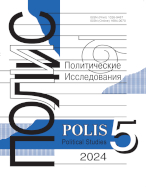Geopolitics and the Future of the Rusian Federation
DOI: 10.17976/jpps/2002.02.08
Evangelista M. Geopolitics and the Future of the Rusian Federation . – Polis. Political Studies. 2002. No. 2. https://doi.org/10.17976/jpps/2002.02.08
The article takes a critical look at one particular geopolitical theory and its relevance to Russia; the theory was developed by the US sociologist Randall Collins drawing on the work of Max Weber. Collins justifies the study of geopolitical theory because he does believe that it tells us a great deal about how developments unfold in the long run. Indeed, he set forth his especial geopolitical theory, applied it to the Soviet Union, and made predictions of Soviet decline several years before the beginning of perestroika. In the first part of the article the author reviews Collins' geopolitical theory, as well as his predictions for the Soviet Union, and critically evaluates, next, his explanation for the collapse of the USSR, drawing particularly on the work of G.Derluguian to provide a corrective. Following that, the author looks more closely at the relationship between the theory as it was set forth, and Collins' original sources in Weber's writings on nationalism and political power, in order to explore, then, the implications of Collins' geopolitics to the future of the Russian Federation. He brings back in, finally, some of Weber's ideas, complemented by Derluguian's insights into the demise of the Soviet Union (as well as Ted Hopf's recent work on identity and Russian foreign policy), to suggest alternative futures for Russia.
 Full Text
(электронная версия)
Full Text
(электронная версия)See also:
Palmowski T., Fedorov G.M.,
Russian-Polish Borderland: Problems and Prospects for the Development of Cross-Border Relations. – Polis. Political Studies. 2020. No2
Zamyatin D.N.,
Geopolitics: Major Problems and Results of Development in the 20th Century. – Polis. Political Studies. 2001. No6
Safonov M.V.,
Modern Approaches to the Study of International Institutions (With Studies of the “Big Eight” as Instance). – Polis. Political Studies. 2003. No3
Sakwa R.,
Back to the Wall: Myths and Mistakes that Made the Ukraine Crisis. – Polis. Political Studies. 2015. No4
Korotayev A.V., Bilyuga S.E., Shishkina A.R.,
Correlation between GDP per Capita and Protest Intensity: a Quantitative Analysis. – Polis. Political Studies. 2017. No2





.jpg)






 print
print.jpg)
.jpg)